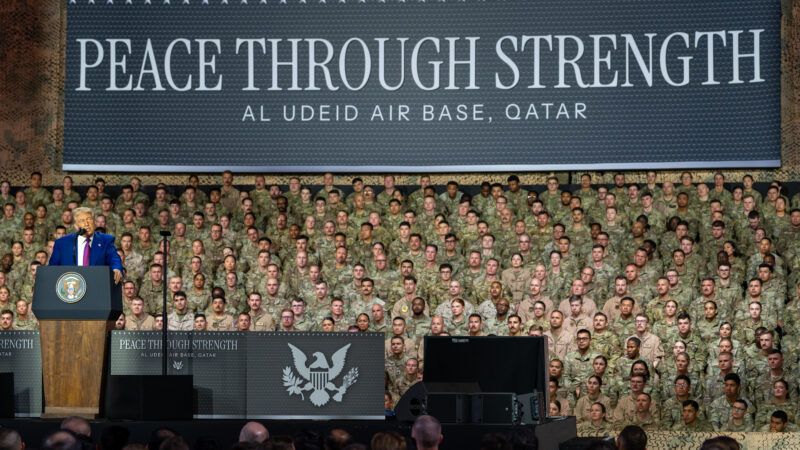Iran's Warning Shot Gives Trump a Way Out of Israel's War
Trump now has a choice between exiting from a position of strength—or jumping further into an endless war.

When U.S. bombers attacked three Iranian nuclear facilities on Saturday, the Iranian government downplayed the damage. And Iran's response was a piece of kayfabe. Iranian missile forces launched 14 missiles, the same number of bunker-buster bombs dropped on Iran, at Qatar's Al Udeid Air Base, the largest U.S. base in the Middle East. The Iranian government reportedly warned Qatar beforehand to prevent any casualties.
This performative warning shot is a chance for the U.S. to duck out of the war. President Donald Trump claims that the Iranian nuclear program, the pretext for this war in the first place, has been "completely and fully obliterated." Even though there are questions about the whereabouts of Iran's enriched uranium, it would take a long time to rebuild the facilities to do anything with that uranium, buying time for a negotiated solution. And Iran seems far more eager to fight Israel, the country that attacked it in the first place, than to expand the war.
"Iran has officially responded to our Obliteration of their Nuclear Facilities with a very weak response, which we expected, and have very effectively countered," Trump wrote on Truth Social. "I am pleased to report that NO Americans were harmed, and hardly any damage was done. Most importantly, they've gotten it all out of their 'system,' and there will, hopefully, be no further HATE. I want to thank Iran for giving us early notice, which made it possible for no lives to be lost, and nobody to be injured. Perhaps Iran can now proceed to Peace and Harmony in the Region, and I will enthusiastically encourage Israel to do the same."
But hawks have continued moving the goalposts through the war. After the Saturday air raids, the neoconservative Foundation for Defense of Democracies began pointing out potential new underground Iranian facilities that need to be bombed. And Fox News host Mark Levin, reportedly an influential voice in Trump's ear pushing for the attack, wrote today that it would be "disastrous" to give the Iranian government a "lifeline" after its retaliation. Trump himself flirted with regime change last night.
They seem to be in a rush to make total war a fait accompli without having to sell it to the public. When the Israeli-Iranian fighting began, only 16 percent of Americans and 23 percent of Republicans wanted to join. New polling suggests that a significant minority of Americans now supports the strikes—the change was mostly from Republicans rallying around the president—but a whopping 85 percent of Americans do not want to be "at war with Iran" afterward.
House Speaker Mike Johnson (R–La.) is opposing any kind of vote on Trump's war powers, and Vice President J.D. Vance is insisting that "we're not at war with Iran," a sign that hawks are not confident in their public support.
Although Trump was reportedly excited by Fox News coverage of the Israeli first strike, a sucker punch that killed Iranian leadership and left Iran disoriented, the conflict is now looking more like a long slog. Iran has managed to fire off consistent missile salvos and grind down U.S.-Israeli air defense ammunition stocks, knocking out infrastructure, including Israel's main oil refinery last week and a major Israeli power plant after the U.S. strikes.
Israeli officials, who had promised a conflict that would only last a few days (and entered the war expecting U.S. involvement), are now warning citizens to prepare for a "prolonged campaign." Prime Minister Benjamin Netanyahu promised on Sunday not to be "dragged into a war of attrition" and hinted that he would declare victory soon. Iran, however, gets a vote. Iranian officials have promised not to negotiate under fire, and are continuing to fire missiles back at Israel, so the Israeli military is promising even more escalation to convince Iran to stop.
The drift in Israeli expectations—from a campaign of a few days to an indefinite, constantly escalating war—is a bad omen for Americans. What hawks promise as a series of one-off strikes can easily become an uncontrollable exchange of fire. Monday's warning shot demonstrated that Iran can do a lot more to menace U.S. forces in the Persian Gulf and the fragile, oil-rich Arab monarchies that host them.
Fortunately, America is not in Israel's bind yet. The United States can easily stay away from the battlefield. The only way Iran can harm (and has ever harmed) Americans is if the U.S. government puts them in harm's way. The Iranian nuclear program, the sole potential global threat emanating from Iran, is off the table for now. And Iran does not seem eager to threaten oil shipping, the only other issue that will affect Americans' lives, unless it feels it has no more cards to play.
But avoiding further conflict means resisting the pro-war sirens of temptation, whether calls for a U.S.-directed regime change or Israeli pleas for support. This war is not America's war. If it wasn't clear before, it should be clear now that Iran does not want to fight America unless it has to. Trump should take the opportunity to declare victory and walk away.
